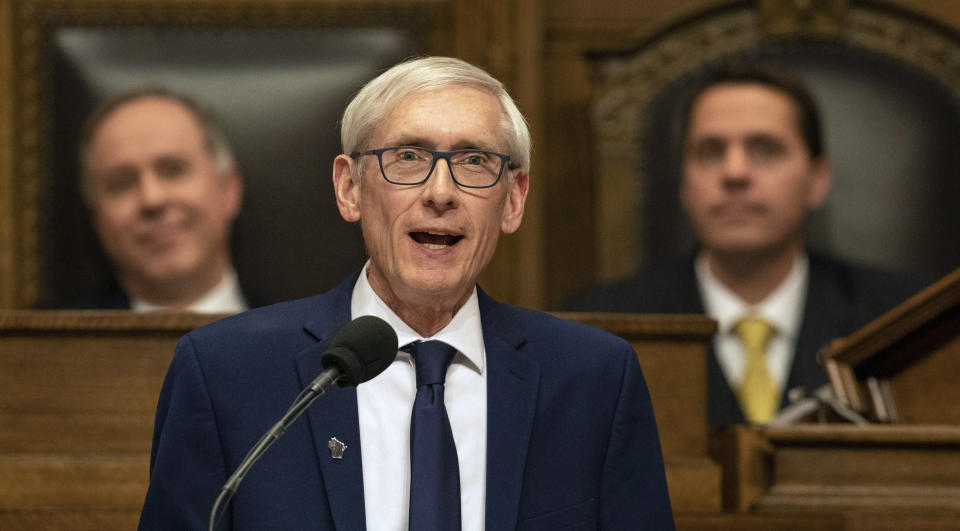Wisconsin Election Back On For Tuesday In The Middle Of Coronavirus Pandemic
Wisconsin will hold its primary election on Tuesday after all.
The state’s high court blocked an emergency order from Gov. Tony Evers (D) that called for a postponement of in-person voting until June — a win for Republicans in the state who have fought any Election Day changes to account for the coronavirus pandemic.
The 4-2 decision, with conservative justices in favor and liberal justices dissenting, came 14 hours before polls are set to open in Wisconsin. An hour later, the U.S. Supreme Court ruled that all absentee ballots had to be postmarked by April 7 and received by April 13 to be counted — accepting yet another Republican appeal to restrict mail-in voting.
That vote, too, was along ideological lines. As of Monday, the Wisconsin Election Commission reported that 43% of requested absentee ballots had not been returned. Those who do not receive a ballot by Tuesday will have to vote in person.
“The Supreme Court of the United States legislated from the bench today, following Trump team’s orders and writing a new election law to disenfranchise untold thousands of Wisconsin voters and consign an unknown number of Wisconsinites to their deaths,” Ben Wikler, the chair of the Democratic Party of Wisconsin, said Monday night in a statement.
My official statement: "The Supreme Court of the United States legislated from the bench today, following Trump team's orders and writing a new election law to disenfranchise untold thousands of Wisconsin voters and consign an unknown number of Wisconsinites to their deaths."
— Ben Wikler (@benwikler) April 7, 2020
Evers tried to unilaterally change the election’s date to June 9 in an order unveiled Monday afternoon. The order stood on uneasy legal grounds, as Wisconsin’s primary election date is set by state statute. Last week, even Evers, seemingly resigned to the April 7 election, said his hands were tied.
Republicans hellbent on keeping Election Day plans intact appealed Evers’ order immediately.
“Defying numerous state-election statutes and his countless previous statements that he clearly lacks legal authority to cancel tomorrow’s election, the Governor announced moments ago — at the eleventh hour — that he was doing just that,” Republicans’ petition to the high court said.
Wisconsin had reported more than 2,300 cases of the coronavirus and more than 70 related deaths as of Monday afternoon — the number of cases more than doubled in the last week. Evers imposed a stay-at-home order on March 25, shuttering all nonessential businesses and forbidding people who don’t live in the same household from gathering.
The Republican-majority state Legislature has refused to change the election to mail-in ballots only, as Evers repeatedly proposed. The governor, in a last-minute plea to state lawmakers, called for a special session of the Legislature on Saturday, but Republicans gaveled out in mere seconds.

Wisconsin will vote in the presidential primary as well as general elections for local and state offices Tuesday. One notable race is for a seat on the state’s Supreme Court, where incumbent Dan Kelly, a Donald Trump-endorsed conservative justice, is up for election. Wisconsin Democrats have raised concerns that state Republicans are trying to keep voter turnout low to protect the conservative seat. Kelly did not participate in the Monday decision blocking Evers’ order. Changing the election’s date would have been more complicated in the state, as some of the seats up for election are term-limited and up at the end of April.
A federal court ruled in favor of expanding absentee voting by extending the deadline to submit ballots from April 7 to April 13. State Republicans unsuccessfully tried to appeal the April 13 extension but did manage to get further restrictions through an appeal Justice Brett Kavanaugh referred to the Supreme Court.
State Senate Majority Leader Scott Fitzgerald and Assembly Speaker Robin Vos, both Republicans, have called voting essential business and said the governor’s proposal to send absentee ballots to every voter registered in Wisconsin was logistically impossible.
“Hundreds of thousands of workers are going to their jobs every day, serving in essential roles in our society. There’s no question that an election is just as important as getting take-out food,” they said in a statement last week.
The state’s elections administrator continued planning for an election Tuesday, despite Evers’ order, knowing there was this possibility for a court appeal. But the state is still facing an uphill battle; there’s a massive shortage of poll workers, the governor has already had to deploy thousands of National Guards to staff polling stations and the state is seeing possibly more absentee ballots than it has ever had to process.
On Friday, the Milwaukee Election Commission announced the city was consolidating its usual 180 polling stations to just five, potentially increasing the risk of overcrowded public spaces. A week ago, 60% of all Wisconsin towns and cities were reporting staffing shortages.
The state has already warned to not expect results on Election Day, as more than 1 million absentee ballots have been requested. They can be counted as long as they’re sent in by Tuesday and received by April 13.
A HuffPost Guide To Coronavirus
Stay up to date with our live blog as we cover the COVID-19 pandemic
How long are asymptomatic carriers contagious?
What to do if you can’t pay rent right now
How to switch off from work when home is your office
Why we should forgive student loans for doctors on the front lines
How to make a face mask with just a bandana
How long does coronavirus live in the air?
What coronavirus questions are on your mind right now? We want to help you find answers.
Everyone deserves accurate information about COVID-19. Support journalism without a paywall — and keep it free for everyone — by becoming a HuffPost member today.
Love HuffPost? Become a founding member of HuffPost Plus today.
This article originally appeared on HuffPost.

